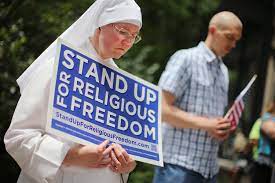The U.S. Supreme Court agreed to hear a Christians web designer’s free speech claim that she cannot be forced under a Colorado anti-discrimination law to produce websites for same-sex marriages.
The case will decide if you can be a Christian web designer in America today. This will soon devolve into whether you can be a Christian in America.
The idea of what is encompassed in the idea of religious liberty has been intentionally narrowed in recent years. The left seems to want to say it’s a Sunday thing when, in reality, if it ain’t a 24/7/365 thing, it ain’t real.
Reuters: The justices took up evangelical Christian Denver-area business owner Lorie Smith’s appeal of a lower court ruling rejecting her bid for an exemption from a Colorado law barring discrimination based upon sexual orientation and certain other factors. The case follows the Supreme Court’s 2018 ruling in favor of a Christian Denver-area baker who refused on religious grounds to make a wedding cake for a gay couple.
Smith’s case gives the justices an opportunity to answer a question that has been raised in other disputes including the baker case but never definitively resolved: can people refuse service to customers in violation of public accommodation laws based on the idea that fulfilling a creative act such as designing a website or baking a cake is a form of free speech under the U.S. Constitution’s First Amendment.
The justices are set to hear oral arguments and decide the case in the Supreme Court’s next term, which begins in October and ends in June 2023.
The court declined to take up a separate question concerning whether Smith has a religious rights claim, also under the First Amendment. Smith had asked the court to overturn its important 1990 ruling that limited the ability of people to cite their religious beliefs in seeking exemptions from laws that apply to everyone.

Leave a Reply